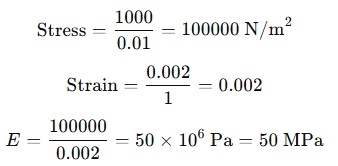Young Modulus Calculator
A Young’s Modulus Calculator is a tool used to determine the Young’s modulus (E) of a material — a measure of its stiffness or elasticity. It tells us how much a material deforms under stress and helps understand how strong or flexible it is.
Why use a Young’s Modulus Calculator?
- Material Analysis: To compare the stiffness of different materials like steel, rubber, or wood.
- Engineering Design: Ensures materials chosen for structures and products can handle expected loads without excessive deformation.
- Accuracy: Simplifies calculations and reduces human error.
- Efficiency: Quickly determines material properties without manually working out formulas.
How does a Young’s Modulus Calculator work?
It uses this formula:

Where:
- E (Young’s Modulus) is measured in pascals (Pa) or N/m².
- Stress is the force applied per unit area: Stress=F/A (where F is force and A is cross-sectional area).
- Strain is the relative deformation: Strain=ΔL/L Strain = L ΔL (where ΔL is the change in length and L is the original length).
For example, if a force of 1000 N stretches a steel wire with a cross-sectional area of 0.01 m2 by 0.002 m when its original length was 1 m:

When to use a Young’s Modulus Calculator?
- In civil engineering for construction material analysis.
- In mechanical engineering for designing machine parts.
- In research labs to test the properties of new materials.
- In education to help students understand material strength and elasticity.